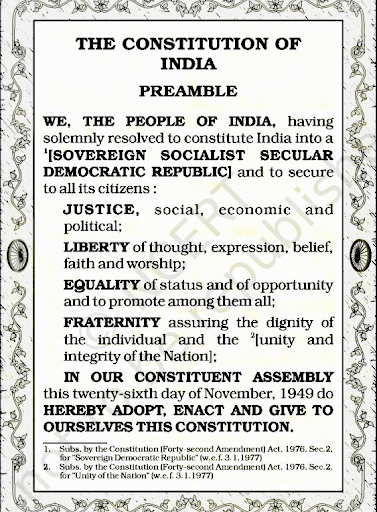The Preamble of the Indian Constitution is an introductory statement that outlines the fundamental principles and objectives of the Constitution. It is a concise and powerful statement that reflects the aspirations and values of the Indian people. The Preamble is an integral part of the Constitution and serves as a guide to interpreting its provisions. It was adopted by the Constituent Assembly on 26th November 1949, and came into effect on 26th January 1950, when the Constitution was enacted.
Source - Timesofindia
The Preamble begins with the words "We, the people of India," which reflects the democratic nature of the Indian Constitution. The use of the phrase "We, the people" signifies that the Constitution derives its authority from the people of India, who are the ultimate source of power in the country. The Preamble contains several important keywords, which are discussed below.
Sovereign: The term sovereign means that India is a self-governing nation, and its government is not subject to external control or influence. It implies that the Indian Constitution is the supreme law of the land, and all citizens and institutions must respect its provisions.
Socialist: The term socialist reflects the commitment of the Indian Constitution to the principles of social justice and equality. It emphasizes the need to eliminate poverty, inequality, and exploitation, and to promote the welfare of all citizens.
Secular: The term secular means that the Indian Constitution guarantees freedom of religion to all citizens, and the State does not endorse or promote any particular religion. It implies that the State is neutral in matters of religion and treats all religions equally.
Democratic: The term democratic signifies that the Indian Constitution is based on the principles of democracy, which includes free and fair elections, the rule of law, and the protection of individual rights and freedoms. It implies that the government is accountable to the people, and the people have the right to participate in the decision-making process.
Republic: The term republic means that India is a sovereign state, and its head of state is elected by the people. It implies that the Indian Constitution provides for a representative government that is accountable to the people.
Justice: The term justice reflects the commitment of the Indian Constitution to the principles of social, economic, and political justice. It implies that the State must ensure that all citizens have access to justice, and that there is no discrimination based on caste, gender, religion, or any other grounds.
Liberty: The term liberty signifies that the Indian Constitution guarantees freedom of speech, expression, assembly, and association to all citizens. It implies that the State must respect and protect the rights of individuals to live their lives as they see fit, as long as they do not infringe on the rights of others.
Equality: The term equality reflects the commitment of the Indian Constitution to the principle of equal treatment under the law. It implies that all citizens are equal before the law, and there is no discrimination based on caste, gender, religion, or any other grounds.
Fraternity: The term fraternity means a sense of brotherhood. The constitution of India promotes the feeling of fraternity by the system of single citizenship.



0 Comments